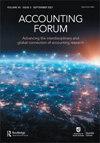Soft law regulation and labour rights reporting: a deficit in moral legitimacy?
IF 3.4
4区 管理学
Q2 BUSINESS, FINANCE
引用次数: 0
Abstract
ABSTRACTThis paper compares and contrasts British and German transnational corporations’ (TNCs) reporting on the labour rights of workers in their global value chains (GVCs) for the years 2012 and 2018, using the Global Reporting Initiative (GRI) guidelines – an initiative that comes under the category of soft law regulation. Between these dates, regulatory changes took place in Britain and in the EU which had relevance to the reporting of labour rights issues more generally. Simultaneously the GRI reporting guidelines shifted to more flexible requirements in the transition from G3.1 to G4. This paper examines the consequences of these changes and finds that, in combination, these changes did not lead TNCs to improving the labour rights reporting. The paper suggests that even though reporting to international guidelines tends to be context-based, there was some convergence in this broadly negative outcome. This all suggests that there was an element of regulatory capture in the shifts to softer regulatory regimes. Conceptually, this points to a reduction in substantive disclosures and leads to a deficit in moral legitimacy and its displacement by more pragmatic legitimacy.KEYWORDS: British TNCsGerman TNCslabour rights reportingmoral legitimacypragmatic legitimacyregulatory capture AcknowledgementsWe would also like to thank two anonymous reviewers for their constructive comments, suggestions and also thank the Editors for their valuable inputs. We wish to gratefully acknowledge the financial support of the British Academy's charitable trust (BA/Leverhulme Small Research Grants – SRG 2012–2013 Round).Disclosure statementNo potential conflict of interest was reported by the author(s).FundingThis work was supported by Leverhulme Trust: [Grant Number SRG 2012-13].Notes1 “Soft” laws denote agreements, principles and declarations that are not binding (Abbott & Snidal, 2000). GRI reporting guidelines/standards are regarded as soft law.2 While globalisation and its neo-liberal forces promote investors’ interests (Sikka & Stittle, Citation2019) and TNCs promote private governance mechanisms (in parallel with neo-liberalism) (Bartley, Citation2018), social governance mechanisms (such as independent national/international NGOs) are best placed to help uphold labour rights along GVCs (Parsa et al. Citation2018). Given GVCs’ exposure to different national and political contexts (Pasquali et al., 2021), social governance mechanisms need to interact with and secure the support of national governments (Mayer et al., Citation2017). In reality, however, such supports are weak to non-existent (Siddiqui et al., Citation2020), making international audiences that could monitor and protect labour rights weak.3 Despite the rising international awareness of labour rights issues within GVCs, the prevalence globalisation and its neo-liberal forces (Sikka & Stittle, Citation2019) has meant that to this day there has been no international governance mechanism that would exert pressures on companies to report details (Parsa & Werner, Citation2023). Hence, national audiences are likely to remain as the key audiences.4 The largest global public limited companies (https://www.forbes.com/sites/andreamurphy/2016/05/25/how-we-crunch-the-numbers/#b7bf3d87467b).5 By the year 2018, 16 British and 3 German TNCs abandoned reporting to GRI. 3 British and 3 German TNCs switched to GRI standards. There was only one minor revision to one of the Human Rights indicators in the transition from GRI G4 to GRI Standards. This change did not affect our data collection.6 Under the GRI G3.1, companies were required to use their GRI index table to indicate if they had reported on all sub-categories (i.e., full disclosure) or on some of them (i.e., partial disclosures) or they had no disclosure (Parsa et al., Citation2018).7 The Equal Remuneration Convention, 1951, No.100; The Discrimination Convention, 1958, No.111.8 Over decades, there have been many international efforts, such as UN and ILO Conventions, for the elimination of child labour (Cunningham & Viazzo, Citation1996), forced labour (Ollus, Citation2015) and freedom of association (Caraway, Citation2006).Additional informationFundingThis work was supported by Leverhulme Trust: [Grant Number SRG 2012-13].软法律法规和劳工权利报告:道德合法性的缺失?
摘要本文使用全球报告倡议组织(GRI)的指导方针,对2012年和2018年英国和德国跨国公司(TNCs)在其全球价值链(GVCs)中工人劳工权利的报告进行了比较和对比——这是一项属于软法律监管范畴的倡议。在这些日期之间,英国和欧盟发生了与更普遍的劳工权利问题报告相关的监管变化。同时,GRI报告指南在从G3.1过渡到G4的过程中转向了更灵活的要求。本文审查了这些变化的后果,发现综合起来,这些变化并没有导致跨国公司改善劳工权利报告。这篇论文表明,尽管按照国际准则进行报告往往是基于背景的,但在这种广泛的负面结果中存在一些趋同。这一切都表明,在向更宽松的监管制度转变的过程中,存在着监管俘获的因素。从概念上讲,这表明实质性披露的减少,导致道德合法性的缺失,并被更务实的合法性所取代。关键词:英国跨国公司、德国跨国公司、劳工权利报告、道德合法性、务实合法性、监管获取致谢我们还要感谢两位匿名审稿人提出的建设性意见和建议,并感谢编辑们提供的宝贵意见。我们希望感谢英国学院慈善信托的财政支持(BA/利华休姆小额研究资助- SRG 2012-2013轮)。披露声明作者未报告潜在的利益冲突。本研究由Leverhulme Trust资助:[基金号SRG 2012-13]。注1“软”法律是指不具有约束力的协议、原则和声明(雅培和斯尼达尔,2000)。GRI报告准则/标准被视为软法律虽然全球化及其新自由主义力量促进了投资者的利益(Sikka & stitle, Citation2019),跨国公司促进了私人治理机制(与新自由主义并行)(Bartley, Citation2018),但社会治理机制(如独立的国家/国际非政府组织)最适合帮助维护全球价值链中的劳工权利(Parsa等)。Citation2018)。鉴于全球价值链暴露于不同的国家和政治背景(Pasquali et al., 2021),社会治理机制需要与国家政府互动并获得支持(Mayer et al., Citation2017)。然而,在现实中,这种支持是弱到不存在(Siddiqui等人,Citation2020),使得国际观众可以监测和保护劳工权利尽管全球价值链中劳工权利问题的国际意识不断提高,但普遍的全球化及其新自由主义力量(Sikka & stitle, Citation2019)意味着,到目前为止,还没有国际治理机制向公司施加压力,要求其报告细节(Parsa & Werner, Citation2023)。因此,国内观众可能仍然是主要观众截至2018年,16家英国跨国公司和3家德国跨国公司放弃向GRI报告。3家英国和3家德国跨国公司改用GRI标准。在从GRI G4向GRI标准过渡的过程中,对其中一项人权指标只有一个小的修改。这一变化不影响我们的数据收集根据GRI G3.1,公司被要求使用他们的GRI索引表来表明他们是否报告了所有子类别(即完全披露)或其中一些(即部分披露),或者他们没有披露(Parsa等人,Citation2018)《同酬公约》,1951年,第100号;几十年来,在消除童工(Cunningham & Viazzo, Citation1996)、强迫劳动(Ollus, Citation2015)和结社自由(Caraway, Citation2006)方面,国际社会做出了许多努力,例如联合国和国际劳工组织的公约。本研究由Leverhulme Trust资助:[基金号SRG 2012-13]。
本文章由计算机程序翻译,如有差异,请以英文原文为准。
求助全文
约1分钟内获得全文
求助全文
来源期刊

Accounting Forum
BUSINESS, FINANCE-
CiteScore
5.20
自引率
6.50%
发文量
0
期刊介绍:
Accounting Forum publishes authoritative yet accessible articles which advance our knowledge of theory and practice in all areas of accounting, business finance and related subjects. The journal both promotes greater understanding of the role of business in the global environment, and provides a forum for the intellectual exchange of academic research in business fields, particularly in the accounting profession. Covering a range of topical issues in accounting, business finance and related fields, Accounting Forum''s main areas of interest are: accounting theory; auditing; financial accounting; finance and accounting education; management accounting; small business; social and environmental accounting; and taxation. Of equal interest to practitioners, academics, and students, each issue of the journal includes peer-reviewed articles, notes and comments section.
 求助内容:
求助内容: 应助结果提醒方式:
应助结果提醒方式:


